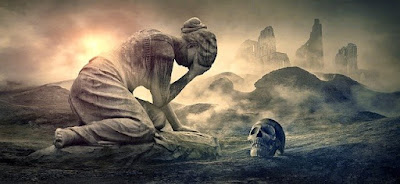Since then, I've been struggling with strange thoughts which have caused me to really question my sanity, feel detached from reality, be really emotional and over-analytical of my thoughts, and just trying to process what death is, and the knowledge that we are all mortal. I've also been having some images of myself being violent in my mind which I'm hoping are a direct result of the experience (I call them 'daymares'). These thoughts have escalated to the point where I sometimes actually believe that I'm capable of violence, or the thoughts trick me into thinking I WANT to be violent. (I don't FEEL like I want to do these things, and I've certainly never had to physically stop myself - it's like my mind has its own agenda.) This is in direct and total opposition to the me I know, love and am familiar with - I'm normally loving, empathetic, and generous - without question. I feel so lost. These thoughts make me loathe myself - because of their content and the fact that I can't control them. I'm having therapy, as well as doing my best to keep the communication lines open with my family and partner, although it's been quite difficult. It would help me so much to hear from others who have had 'strange' thoughts, whether as a result of grief or depression. I just need to not feel so alone....
My response: I’m so sorry for your loss, and I can only imagine how shocking it must have been for you to enter your grandmother’s room only to discover, without any warning or preparation, that she had already died. Even when we think we are prepared and know what to expect, we still find it very difficult to take in the death of a person we love. Death is one of those facts of life that we find easier to acknowledge with our brain than with our heart. And even though our intellect may say, “Yes, she has died,” the rest of us will still be trying hard to deny it.
It seems to me that what you are experiencing now is that painful period when grief is felt most intensely and your reactions are most acute. You are confronting not only the reality of losing your grandmother, but also your own mortality, and you are in the process of absorbing what all of this means. That is why we say that mourning is a process, not a single event.
You have entered the painful but necessary period that grief expert Therese Rando describes as a time of angry sadness:
“There are extremes of emotion . . . It is an overwhelming, confusing, and frightening time as the mourner experiences types, intensities, and vacillations of emotions that make him unrecognizable to himself, afraid of who and what he will become, and fearful of losing his mind. The individual tries to maintain psychological equilibrium by alternately avoiding and approaching the material as he attempts to process it and work it through . . .”
It’s good to know that you are seeing a therapist to help you through this process, and I cordially invite you to join our online Grief Healing Discussion Groups ~ truly a warm and caring place. I hope that as a member there, you will soon hear from others whose experiences are similar to your own, because I think you’ll find it very reassuring to discover that you are not crazy, you are not lost and you are not alone.
Your feedback is welcome! Please feel free to leave a comment or a question, or share a tip, a related article or a resource of your own in the Comments section below. If you’d like Grief Healing Blog updates delivered right to your inbox, you’re cordially invited to subscribe to our weekly Grief Healing Newsletter. Sign up here.
Related:
Image by Stefan Keller from Pixabay© by Marty Tousley, RN, MS, FT, BC-TMH























No comments:
Post a Comment
Your comments are welcome!